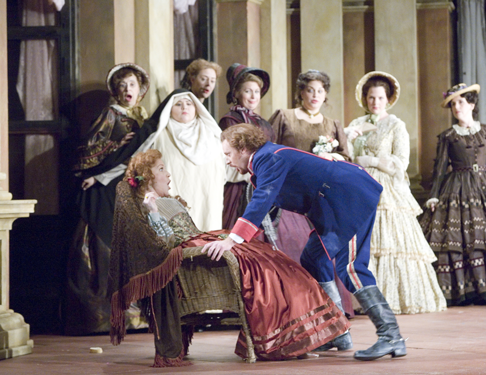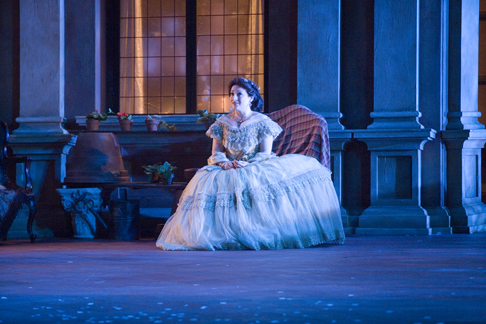![Joyce DiDonato as Beatrice in HGO's production of Berlioz's Beatrice and Benedict [Photo by Andrew Cloud]](http://www.operatoday.com/Joyce-AC2.png)
07 Nov 2008
Houston brushes up its Shakespeare
In 1830, three years after the death of Beethoven and two after Schubert’s untimely demise, Berlioz, 27, dazzled the world with his phantasmagoric — perhaps drug-inspired — Symphonie fantastique.
English Touring Opera are delighted to announce a season of lyric monodramas to tour nationally from October to December. The season features music for solo singer and piano by Argento, Britten, Tippett and Shostakovich with a bold and inventive approach to making opera during social distancing.
This tenth of ten Live from London concerts was in fact a recorded live performance from California. It was no less enjoyable for that, and it was also uplifting to learn that this wasn’t in fact the ‘last’ LfL event that we will be able to enjoy, courtesy of VOCES8 and their fellow vocal ensembles (more below …).
Ever since Wigmore Hall announced their superb series of autumn concerts, all streamed live and available free of charge, I’d been looking forward to this song recital by Ian Bostridge and Imogen Cooper.
The Sixteen continues its exploration of Henry Purcell’s Welcome Songs for Charles II. As with Robert King’s pioneering Purcell series begun over thirty years ago for Hyperion, Harry Christophers is recording two Welcome Songs per disc.
Although Stile Antico’s programme article for their Live from London recital introduced their selection from the many treasures of the English Renaissance in the context of the theological debates and upheavals of the Tudor and Elizabethan years, their performance was more evocative of private chamber music than of public liturgy.
In February this year, Albanian soprano Ermonela Jaho made a highly lauded debut recital at Wigmore Hall - a concert which both celebrated Opera Rara’s 50th anniversary and honoured the career of the Italian soprano Rosina Storchio (1872-1945), the star of verismo who created the title roles in Leoncavallo’s La bohème and Zazà, Mascagni’s Lodoletta and Puccini’s Madama Butterfly.
Evidently, face masks don’t stifle appreciative “Bravo!”s. And, reducing audience numbers doesn’t lower the volume of such acclamations. For, the audience at Wigmore Hall gave soprano Elizabeth Llewellyn and pianist Simon Lepper a greatly deserved warm reception and hearty response following this lunchtime recital of late-Romantic song.
Collapsology. Or, perhaps we should use the French word ‘Collapsologie’ because this is a transdisciplinary idea pretty much advocated by a series of French theorists - and apparently, mostly French theorists. It in essence focuses on the imminent collapse of modern society and all its layers - a series of escalating crises on a global scale: environmental, economic, geopolitical, governmental; the list is extensive.
For this week’s Live from London vocal recital we moved from the home of VOCES8, St Anne and St Agnes in the City of London, to Kings Place, where The Sixteen - who have been associate artists at the venue for some time - presented a programme of music and words bound together by the theme of ‘reflection’.
'Such is your divine Disposation that both you excellently understand, and royally entertaine the Exercise of Musicke.’
Amongst an avalanche of new Mahler recordings appearing at the moment (Das Lied von der Erde seems to be the most favoured, with three) this 1991 Mahler Second from the 2nd Kassel MahlerFest is one of the more interesting releases.
‘And there was war in heaven: Michael and his angels fought against the dragon; and the dragon fought and his angels, And prevailed not; neither was their place found any more in heaven … that old serpent … Satan, which deceiveth the whole world: he was cast out into the earth, and his angels were cast out with him.’
If there is one myth, it seems believed by some people today, that probably needs shattering it is that post-war recordings or performances of Wagner operas were always of exceptional quality. This 1949 Hamburg Tristan und Isolde is one of those recordings - though quite who is to blame for its many problems takes quite some unearthing.
There was never any doubt that the fifth of the twelve Met Stars Live in Concert broadcasts was going to be a palpably intense and vivid event, as well as a musically stunning and theatrically enervating experience.
‘Love’ was the theme for this Live from London performance by Apollo5. Given the complexity and diversity of that human emotion, and Apollo5’s reputation for versatility and diverse repertoire, ranging from Renaissance choral music to jazz, from contemporary classical works to popular song, it was no surprise that their programme spanned 500 years and several musical styles.
The Academy of St Martin in the Fields have titled their autumn series of eight concerts - which are taking place at 5pm and 7.30pm on two Saturdays each month at their home venue in Trafalgar Square, and being filmed for streaming the following Thursday - ‘re:connect’.
The London Symphony Orchestra opened their Autumn 2020 season with a homage to Oliver Knussen, who died at the age of 66 in July 2018. The programme traced a national musical lineage through the twentieth century, from Britten to Knussen, on to Mark-Anthony Turnage, and entwining the LSO and Rattle too.
With the Live from London digital vocal festival entering the second half of the series, the festival’s host, VOCES8, returned to their home at St Annes and St Agnes in the City of London to present a sequence of ‘Choral Dances’ - vocal music inspired by dance, embracing diverse genres from the Renaissance madrigal to swing jazz.
Just a few unison string wriggles from the opening of Mozart’s overture to Le nozze di Figaro are enough to make any opera-lover perch on the edge of their seat, in excited anticipation of the drama in music to come, so there could be no other curtain-raiser for this Gala Concert at the Royal Opera House, the latest instalment from ‘their House’ to ‘our houses’.
"Before the ending of the day, creator of all things, we pray that, with your accustomed mercy, you may watch over us."
![Joyce DiDonato as Beatrice in HGO's production of Berlioz's Beatrice and Benedict [Photo by Andrew Cloud]](http://www.operatoday.com/Joyce-AC2.png)
In 1830, three years after the death of Beethoven and two after Schubert’s untimely demise, Berlioz, 27, dazzled the world with his phantasmagoric — perhaps drug-inspired — Symphonie fantastique.
With it, he opened the gates through which the monumental programmatic scores of the 19th century would soon flood the musical scene. In 1862- Berlioz wrapped up his career with the opéra comique Beatrice and Benedict, a brief and understated score of such grace and delicacy that the composer saw it as one of his loveliest and most original works — indeed, “as a caprice written with the point of a needle.”
The Houston Grand Opera, founded in 1955, kicked off its 2008 season with the work, for which Berlioz extracted the libretto from Shakespeare’s Much Ado About Nothing. In its first staging of any Berlioz work, the HGO made the Australian Opera production a delight, further underscoring the high quality that Anthony Freud in his second full year as its general director, insists upon with this company.
Australia apparently offers escape from the excesses of European Regieoper, for this production, the work of Elijah Moshinsky, recreated for Houston by Robin Tebbutt, is simple and straightforward and set realistically in the middle of Berlioz’ own 19th century. It is beautiful and enchanting. Michael Yeargan’s single outdoors set, rich in autumnal hues, is magically lighted by Howard Harrison, whose twilight is of a perfection that outdoes Nature herself, and the very full moon that rises through an arched entrance is astonishingly unhackneyed. It’s a fine touch that Moshinsky has the happy ending of the opera — a huge double wedding — caught by a period photographer. The curtain falls as his light flashes.
The performance heard on November 2, was as impressive vocally as it was visually. Joyce DiDonato and Norman Reinhardt sang the spunky title figures, two young people, proud and individually minded, fighting the fact that they are madly in love with each other. In DiDonato, now an international star, one experiences magnificent growth with each encounter; it is hardly surprising that she walks a path already strewn with awards. And Reinhardt, tall, handsome and virile of voice, is a perfect partner for her.
It is, however, Ireland’s Ailish Tynan who almost steals the show as Hero, the gentle and steadfast female of the story’s second couple. Tynan, celebrated both in Europe and the US as Susanna, Papagena and Zerlina, is a petite woman who sings with shimmering ease. And one wished that Berlioz had provided her partner Claudio, baritone Lian Bronner, with more to sing.
 Norman Reinhardt (Benedict) and Joyce DiDonato (Beatrice) in Berlioz's Beatrice and Benedict [Photo by Felix Sanchez]
Norman Reinhardt (Benedict) and Joyce DiDonato (Beatrice) in Berlioz's Beatrice and Benedict [Photo by Felix Sanchez]
Yet a third female brought splendor to the cast: Leann Sandel-Pantaleo, who was stellar as Hero’s lady-in-waiting Ursule. Hers is a voice of such melting gentleness that it is difficult to imagine that Amneris and Siegrune are among her signature roles. The duet with which Tynan and Sandel-Pantaleo concluded Act One, was a masterpiece of refined singing.
Indeed, so overwhelming were the three sopranos in the HGO cast that one wondered whether Strauss might have taken cues from Berlioz in composing Rosenkavalier. Rarely does one hear female voices so touchingly combined. The cast further documented the excellent training offered by the HGO studio, for DiDonato, Reinhardt and Bronner are all alumni of the program.
True to the conventions of opéra comique, Berlioz included a good bit of spoken dialogue in his libretto and — concerned about its delivery — instructed singers at the Baden-Baden premiere to “speak like human beings,” and that is exactly what this cast did, allowing speech and music to flow easily into each other.
 Ailish Tynan (Hero) in HGO's production of Berlioz's Beatrice and Benedict [Photo by Felix Sanchez]
Ailish Tynan (Hero) in HGO's production of Berlioz's Beatrice and Benedict [Photo by Felix Sanchez]
An unfortunate exception was veteran actor Donald Maxwell as alcoholic choirmaster Somarone, a role that is largely ad-libbed. Although a great hit with the audience, Maxwell sadly overplayed his hand, speaking further in an overblown British that conflicted sadly with the American English of the remaining cast.
Young German conductor Michael Hofstetter, now maestro of the Stuttgart Chamber Orchestra, showed his understanding of the unique and transparent reserve of this score, while bringing to the surface the melancholy undercurrent of the work. Richard Bado did his usually exemplary work with the HGO chorus.
The HGO performed the musical portion of Beatrice and Benedict in Geoffrey Dunn’s English translation, while Moshinsky, rather than translating Berlioz’ spoken text into English, went directly to Shakespeare for much of that dialogue. It was a fine touch that elevated the stature of the work. Despite its many merits Beatrice and Benedict is an uneven score, which makes the well-rounded coherence of the HGO staging even more admirable.
Wes Blomster